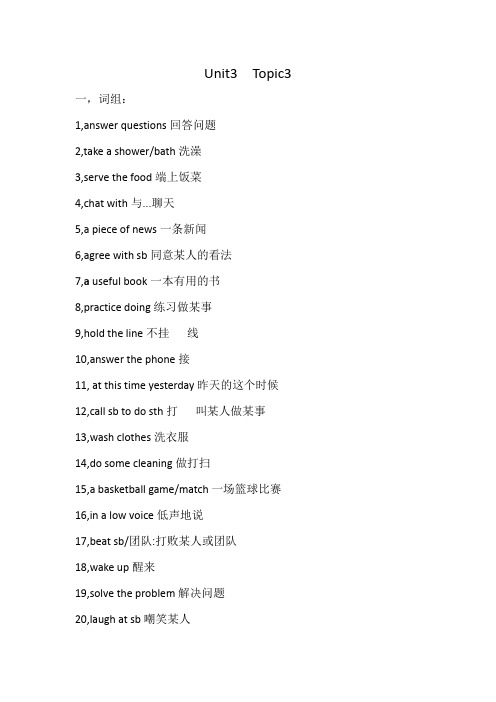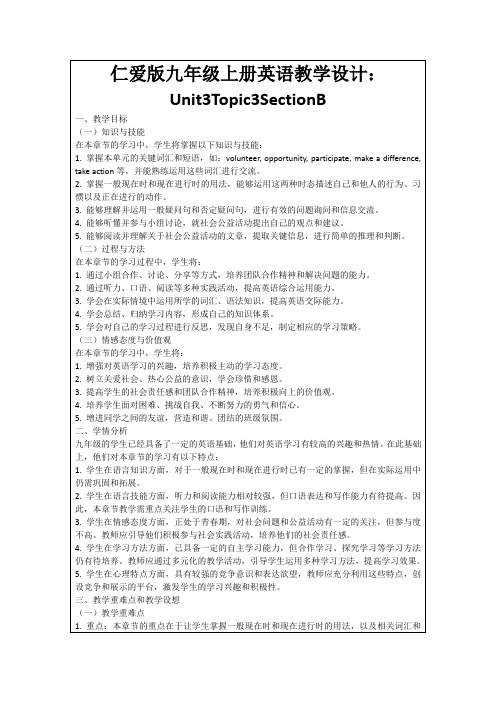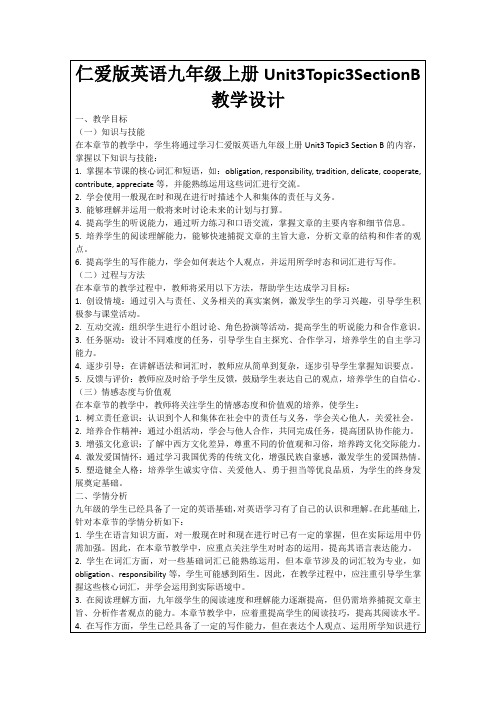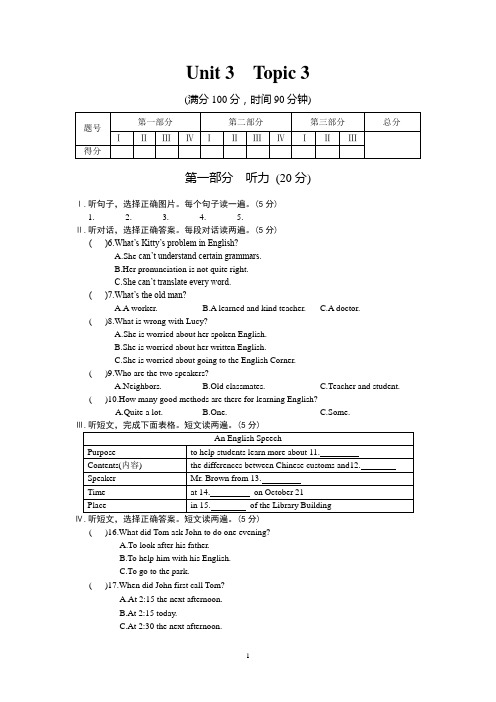Unit3 Topic3 B
仁爱八年级 Unit 3 Topic 3 Section B What were you doing at this time yesterday

I agree with you. I think he is wonderful. No, I don’t think so . I think he is just so so.
It’s important to know the correct ways to agree and disagree when you talk.
1. A: ’Hello ! This is ’Maria speaking! May I ’spea(k) to ’Jane? B: ’Hol(d) the line, please. 2.A: I think ’collecting stamps mus(t) be ’fun. B: ’No .’I don’(t) think so. I think it is ’jus(t) ’so-so. 3.A:’What were you ’doing a(t) ’this time
yesterday? I ’called you to ’go to the ’English
Corner bu(t) ’no one answered. B: ’This time yesterday?’ Oh, I was ’taking a ‘shower.
1.How to express agreement or disagreement.
2. Wasn’t it interesting ? 它没有趣吗?
此句为一般疑问句的否定式。这类疑问句常表 示提问人的惊讶、赞叹、怀疑或责难等语气。回答 时根据实际情况来判断,如果事实上是,用yes; 如 果事实上不是,用no。 Eg: —— Don’t you play chess ? 你不下棋吗? —— Yes, I do. / —— No, I don’t. 不,我下棋。/ 是的, 我不下棋。
Unit3Topic3SectionB (2)

Choose the best answer.
(B ) 6.—I don’t know _____ remember the new English words. —Don’t worry! Try to think about their pronunciations. A. what to B. how to C. where to D. when to ( C )7.—This physics problem is too difficult. Can you show me _____,Wang Li? —Sure. A. what to work it out B. what to work out it C. how to work it out D. how to work out it
what time
2. He is `going to `meet his `friends. what time to meet them . But he `forget ____________________
3. There are `many` kinds of `toothpaste.
one to buy He can’t `decide which _________________.
turn to sb. 向某人求助
e.g. I’m a stranger in the city, and I have to turn to the police 向警察求助) _______________.( 4. Think about your answer, take a deep breath and smile, and then answer the question.思考一下你的问题,深
仁爱九年级英语上册UnitTopic3SectionB

C. come D. arrived
3. Hurry up! The play _____ for ten minutes.
A. has begun
B. had begun
C. has been on
D. began
4. My parents _____ Shandong for ten years.
5. He _b_o__u_g_h_t_ (buy) a house in 2005. He __h_a_s__h_a_d__ (have) a house since 2005.
6. He _b_o_r_r_o_w__e_d_ (borrow) the car in 2009. He _h_a__s_k_e_p__t _ (keep) the car for four years.
D. has left the university
(视频p19-1a)
What is the article about?
homeless people
people in need
We can provide them with something they need. = We can provide something they
Choose the best answer.
1. His father ______ the Party since 1978.
A. joined
B. has joined
C. was
D. has been in
2. —How long have you _____ here?
—About two months. A. been B. gone
-------------------------------------------------------------------------------------
Unit3 Topic3 SectionB 同步学与练(解析版) 2023-24仁爱版九年级英语上册

Unit3 Topic3 Could you give us some advice on how to learn English well?Section B【学习目标】By the end of the lesson, students should be able to:Words and phrases: aloud, ability, textbook, toothpaste, object, be weak in, turn to sb, be afraid of doing sth., take a deep breath, give it a try, advise sb. to do sth.Sentences: Could you give us some advice on how to learn English well?Could you please tell me how to improve my reading ability?I’ll give it a try.Grammar: how / what + to do2. Difficult points:根据例句归纳总结how / what ...+ to do 的用法。
【预习导学】必备单词、短语和句子1 ________________ adv.大声地2________________ n.物品,东西;目的,目标3________________ n.教科书,课本4________________ n.牙膏5.be weak in..._________________6.make mistakes_________________7.take a breath_________________8.as long as_________________9.stick to (doing) sth._________________10.give advice on sth._________________11.stick on_________________12.advise sb. to do sth._________________13.have a try_________________14. Could you give us some advice on how to learn English well?___________________________________________________15.Two years ago, I was also weak in English.___________________________________________________16.Try to guess the meanings of new words, and get the main idea of the article.___________________________________________________17. Think about your answer, take a deep breath and smile, and then answer the question. Smiling is alwayshelpful.____________________________________________________答案:1 aloud adv.大声地2object n.物品,东西;目的,目标3textbook n.教科书,课本4toothpaste n.牙膏5.be weak in...在……方面薄弱6.make mistakes犯错误7.take a breath吸一口气8.as long as只要9.stick to (doing) sth.坚持(做)某事10.give advice on sth.就某事给出建议11.stick on贴上12.advise sb. to do sth.建议某人做某事13.have a try试一下14. Could you give us some advice on how to learn English well?. 你能就如何学好英语给我们提些建议吗?15. Two years ago, I was also weak in English.. 两年前,我的英语也很薄弱。
9.3 Unit 3 Topic 3 Section B(课件)仁爱版九年级英语上册

03 课堂小结
3
We learn:
We can:
Use the structure of wh- /how + to do.
But he `forget _w_h_a_t_t_im__e_t_o__m_e_e_t_t_h_e_m_ .
3. There are `many` kind f `toothpaste.
He can’t `decide w__h_ic_h__o_n_e__to__b_u_y___.
4. He `ha lot of` work to do. He is `wondering _w_h_e_t_h_e_r_t_o_g_o__to__t_h_e_p_a_r_t.y
Li Ming dare not answer questions in class because he is
afraid of making __m_is_t_a_k_e_s__. “Think about your answer,
breath
smile
take a deep _______ and _______” is Kangkang’s answer.
doesn’t know how to improve reading ability
/ə'bɪləti/ n. 能力
Task 2. Listen to 1a and fill in the blanks. Then check the sentences which use wh-/how+ to do.
2021仁爱英语9年级上册Unit 3 Topic 3学科讲义(有答案)

【根底知识稳固】U3T3SA1 places of interest意为“名胜古迹〞。
e.g. There are many places of interest in Beijing.北京有许多名胜古迹。
2 have a long conversation/word/ talk with 与......进展长时间交谈。
3 work hard at 在……方面努力,致力于……。
e.g. They‘re working hard at oral English.他们努力练习英语口语。
hard-working意为“努力的,勤奋的〞,为复合形容词,用作定语,后跟名词。
e.g. He works hard all the time.他一直努力工作。
It’s hard work.这是艰辛的工作。
a hard-working child一个勤奋的孩子4 oral English意为“英语口语〞,等于spoken English。
5 I know oral English is very important, but I dare not speak English in public.我知道口语是很重要的,但是我不敢在公众场合说英语。
dare表示“敢于〞,与need一样,既可用作情态动词,亦可用作实义动词。
用作情态动词时,它只有一种形式,后跟动词原形,主要用于否认句和疑问句。
用作实义动词时,它有第三人称单数式dares,如今分词daring及过去式和过去分词dared,后跟带to的不定式。
e.g. She doesn’t dare to say anything.她什么都不敢说。
〔实义动词〕How dare you speak to me like that!你怎么敢这样对我说话!〔情态动词〕6 in public公开地,当众,公然地。
e.g. He doesn’t like to speak in public.他不喜欢在公共场合讲话。
仁爱八年级上 Unit3 Topic3 SectionB 导学案

仁爱八年级上Unit3 Topic3 SectionB 导学案设计人: 赵爱琴备课组长:杨振娟审核人:连俊伟学习目标:1.掌握Page71-72的单词,重点短语及句型。
2.自学理解文章内容。
3.通过合作探究,熟练掌握和运用下列短语、句型。
agree with sb.同意某人(的话或看法)so handsome真帅be angry with sb.生某人的气make faces做鬼脸make sb. do sth.让某人做某事make sb./sth. +adj.使某人/物…nothing serious 没什么严重的What was he/she/… doing? 他/她/…在做什么?What were you doing? 你在做什么?I agree.=I think so. 我同意I don’t agree.= I don’t think so. 我不同意it is pleasant to do sth. 做…很愉快Don’t do that again.别再做那事了自学引导:1.自学P71-72的单词。
(根据音标拼读,拼写并牢记)2.预习Section B为课堂展示作准备。
3.标出重要的短语和句型,疑难点,准备课堂中讨论解决。
预习自测:I. 词汇(A) 选择正确汉译英:( ) 1. 古典音乐A:Rock music( ) 2. 摇滚音乐B:Classical music( ) 3. 民间音乐C:Folk music( ) 4. 乡村音乐D:Jazz( ) 5. 爵士乐E:Country music(B) 根据句意及汉语提示写出单词,并用其适当形式填空。
6. __________(收集)stamps is my favorite hobby.7. He often makes us __________(笑) in class.8. I was __________(浇)the flowers when my mother came back yesterday.9. Doing exercise can bring us happiness and __________(放松)。
Unit3Topic3重点知识点总结八年级英语上册

Unit3 Topic3一,词组:1,answer questions回答问题2,take a shower/bath洗澡3,serve the food端上饭菜4,chat with与...聊天5,a piece of news一条新闻6,agree with sb同意某人的看法7,a useful book一本有用的书8,practice doing练习做某事9,hold the line不挂线10,answer the phone接11, at this time yesterday昨天的这个时候12,call sb to do sth打叫某人做某事13,wash clothes洗衣服14,do some cleaning做打扫15,a basketball game/match一场篮球比赛16,in a low voice低声地说17,beat sb/团队:打败某人或团队18,wake up醒来19,solve the problem解决问题20,laugh at sb嘲笑某人21,make faces at朝...做鬼脸22,on the last evening of the year旧历年的最后夜晚23,get together团聚24,in one’s hands在某人手中25,pass by经过26,fall down掉下,摔倒27,be afraid to do/of doing sth害怕做某事28,warm sb up使某人温暖29,go out 熄灭30,light a fourth match又划一根火柴31,take sb with sb把某人带上32,lie against the wall靠着墙躺33,knock at/on敲34,enjoy the moon赏月35,at church在教堂36,in the 1800s在19世纪37,stop doing sth停止做某事38,stop to do sth停下来做另一件事39,on Monday mornings在周一早上40,keep the door closed保持门关着二,重点句子:1,The telephone rings while she is practicing the violin.当她正在练习小提琴时,响起了。
七年级仁爱英语 上册 Unit 3 Topic 3 Section B

May I take your order, sir?
(1) take one’s order意为“记下某人点的菜”。 如:The waiter comes over to take my order. (2) sir 意为“先生,阁下”,是对不相识的男 士、男上司、男性长辈或从事某一职务的男 士的尊称,一般不与姓连用。如对方是女性, 则用madam。
It’s time to have lunch.
The three pigs usually have fish and jiaozi for dinner.
What do you usually have for dinner?
—What do you usually have for breakfast/lunch/dinner?
Complete the conversation and then act it out.
A. Would you like some vegetables? B. OK. Something to drink? C. May I take your order? D. Oh ... All right. E. What do you usually have for lunch?
And …
a glass of apple juice
something to drink
chicken with vegetables
something to eat
A: May I take your order, sir? Fish with vegetables and B: ______ _____, rice please. A: Would you like something to drink? B: Yes. A glass of _________, apple juice please. A: OK. Thank you.
Unit 3 Topic3 SectionB教案 仁爱版九年级英语上册

九年级上册Unit 3 Topic 3 Could you give us some advice on how to learn English well?Section B【教学构思】一、教材分析:本课属于课标话题人与自我——“语言学习(Language learning)”中语言学习的策略(Language learning strategies)项目,主要通过康康、王俊峰,李红和李明的对话谈论康康的英语学习方法及针对三人提出的学习问题提供建议。
主要教学活动为1a,2和3,通过1a对话康康分享自己的英语学习经验并对王俊峰、李红和李明提出的问题提供建议,学习疑问词加不定式作宾语和主语的基本用法,训练学生“听”和“说”的语言能力。
通过2练习,巩固疑问词加不定式作宾语和主语的基本用法。
通过小组讨论自己存在的英语学习的问题并提供建议,培养学生“说”的语言能力。
二、设计说明:根据学情和本课的语法及话题,本节课的教学设计将听与说相结合,以1a为载体,立足话题,聚焦语法,通过听说练习内化知识;在语言生成阶段,循序渐进,帮助学生学以致用,并通过同伴合作完成学习任务。
本课在重、难点突破的方法上有所创新,教师最后的语言生成性活动设计成小组活动,不局限于两人搭档,小组成员可以互相交流,分享学习困难,给他人提供帮助,最后再做一个汇报,培养学生提出问题、分析问题和解决问题的能力。
【教学目标】1. 通过听力活动和朗读对话,掌握对话大意和细节,培养“听”与“读”的语言能力;2. 在对话中学习疑问词加不定式作宾语和主语的基本用法,在练习中实践运用,培养“说”的语言能力;3. 在小组活动中实践运用所学语言知识,在讨论、思辨、梳理、概括等思维活动中,发展思维品质。
【教学重难点】疑问词加不定式作宾语和主语的基本用法。
【教学方法】任务型教学法【教具】多媒体设备,教学课件【教学过程】Step 1. Greeting.Step 2. ReviewReview the difficulties the students met in their English study and try to give them some advice. (设计意图:复习Section A对话中学生们提出的困难,并提出个人建议。
仁爱七上英语unit3topic3知识点和练习

Unit3topic3知识点及练习1.help oneself to... 请随便吃/喝...2.would like +名词/to do sth. 想要.../做某事would like sb to do sth 想要某人做某事3.let sb do sth让某人做某事4.why not=why don’t you +动词原形为什么不...5.what about= how about+ 动词ing...怎么样6.be kind to sb. = be friendly to sb.对某人友好7.be glad to do sth.高兴做某事一、选择()1、-- Do Fangfang and Liu Mei have ____ friends here? -- Yes, they do.A. fewB. someC. anyD. little()2. -- ______ I sit here? -- No problem.A. MayB. DoC. DoesD. Have()3. Where does your brother live __________?A. inB. on C . at D. /()4. He ________ to the Great Wall.A. want to goB. wants to goC. want goD. wants go()5. –Where are _______? -- _______ are in ________ classroom.A. their, Their, theyB. they, They, theirC. their, They, theyD. they, Their, their()6. –What are they? -- They are ____.A. teachersB. oldC. good girlD. Chinese()7.The books are those _______.A. girl’sB. girls’sC. girlsD. girls’()8. I know those aren’t _______ factories.A. theyB. theirC. themD. him()9. –What does the boy _______? -- He has brown hair and gray eyes.A. likeB. lookC. look likeD. look the same()10. Our teachers are friendly _______ us.A. inB. onC. forD. to()11. –Would you like some bread? -- _________.A. Yes, pleaseB. No, I don’tC. Yes, I wouldD. No, I wouldn’t()12. –Would you like ________ milk? -- Yes, please.A. anyB. someC. manyD. a()13. We often have _____ noodles and meat _____ supper.A. many, forB. many, withC. some, forD. some, with()14. –What would you like to have? -- I’d like __________.A. two bowl of riceB. two bowls of ricesC. two bowls of riceD. two bowl of rices ()15. Why not __________ some eggs for breakfast?A. havingB. to haveC. haveD. to eat()16. Let’s ________ dinner.A. haveB. to haveC. hasD. to has()17. What would you like __________?A. eatB. eatingC. to eatD. eats()18. Jane, help _________ to some fish.A. youB. yourselfC. yourselvesD. your()19. –What’s that? -- _______ a picture _______ our family.A. Its’, ofB. Its, ofC. It’s, ofD. It’s, for()20.What about _______ some orange juice?A.drinkB.to drinkC.drinksD.drinking二.用所给词的适当形式填空。
2021-2022学年仁爱版英语九年级上册Unit 3 Topic 3-Section B课文课件

How do you make a kite?
Kangkang: I always copy new words on pieces of paper, stick them on the walls in my bedroom or in the living room, and read the words aloud when I see them. I change them often. Also, I always read the English words on the objects I see.
Li Ming dare not answer questions in class because he is afraid of making _m__i_st_a_k_e_s__. “Think about your answer, take a deep __b_r_e_a_th_ and _s_m_i_l_e__” is Kangkang’s answer.
康康:别害羞。思考一下你的问题,深吸一口气,然后微笑, 再回答问题。微笑很有帮助。
李明:谢谢你。我会试试的。
Kangkang: Don't be shy. Think about your answer, take a deep breath and smile, and then answer the question. Smiling is always helpful.
李红:听起来很有趣。我会试试的。我经常读一 些英语课本,但是有些文章对我来说太难了。你 能不能告诉我怎么提高阅读能力呢?
Kangkang: Do more reading. Try to guess the meanings of new words, and get the main idea of the article.
仁爱版九年级上册英语教学设计:Unit3Topic3SectionB

7.教学重难点的突破:
(1)针对一般现在时和现在进行时的难点,可以通过以下方式突破:
a.设计丰富的语境,让学生在具体的情境中感知、运用两种时态。
b.通过对比、归纳,帮助学生掌握两种时态的用法。
c.结合听力、口语、阅读等多种实践活动,让学生在实际运用中巩固所学。
3.教师巡回指导,关注学生的讨论过程,及时解答他们的疑问。
(四)课堂练习
1.教师设计练习题,包括填空、选择、改错等,让学生运用所学知识完成练习,巩固课堂所学。
2.学生进行听力练习,听懂并记录关于公益活动的信息,提高听力水平。
3.学生进行口语练习,用一般现在时和现在进行时描述自己参与公益活动的经历,提高口语表达能力。
5.学生在心理特点方面,具有较强的竞争意识和表达欲望,教师应充分利用这些特点,创设竞争和展示的平台,激发学生的学习兴趣和积极性。
三、教学重难点和教学设想
(一)教学重难点
1.重点:本章节的重点在于让学生掌握一般现在时和现在进行时的用法,以及相关词汇和短语的运用。此外,培养学生对社会公益活动的关注和参与意识也是教学重点。
(五)总结归纳
1.教师引导学生回顾本节课所学内容,总结一般现在时和现在进行时的用法,以及相关词汇和短语。
2.学生分享学习收获,交流在小组讨论和课堂练习中的感悟。
3.教师强调社会公益活动的重要性,鼓励学生积极参与,将所学知识运用到实际生活中。
4.布置课后作业,要求学生用一般现在时和现在进行时编写一段关于公益活动的对话,进一步巩固所学知识。
2.讲解一般现在时和现在进行时的用法,通过对比、归纳,让学生掌握两种时态的基本结构和用法。
仁爱版英语九年级上册Unit3Topic3SectionB教学设计

3.增强文化意识:了解中西方文化差异,尊重不同的价值观和习俗,培养跨文化交际能力。
4.激发爱国情怀:通过学习我国优秀的传统文化,增强民族自豪感,激发学生的爱国热情。
5.塑造健全人格:培养学生诚实守信、关爱他人、勇于担当等优良品质,为学生的终身发展奠定基础。
难点:学生对一般将来时的运用以及如何在写作中表达个人观点是教学的难点。同时,如何引导学生将所学知识与社会实践相结合,培养学生的责任意识和合作精神,也是本节课的难点。
2.语法难点:一般现在时和现在进行时的区别与运用,以及一般将来时的构成和用法。
3.词汇难点:学生对专业词汇的理解和运用,如obligation、responsibility等。
(二)教学设想
1.创设情境:以现实生活中的案例为背景,导入本节课的主题,激发学生的学习兴趣,引导学生关注个人和集体的责任与义务。
2.分阶段教学:
a.词汇教学:通过图片、例句等形式,帮助学生பைடு நூலகம்解和记忆核心词汇,并设计相关练习,巩固词汇运用。
b.语法教学:结合具体语境,讲解一般现在时、现在进行时和一般将来时的用法,并通过练习巩固所学。
3.每个小组选取一名代表,汇报本组的讨论成果,其他小组成员可进行补充。
4.教师对每个小组的讨论成果进行点评,总结学生在讨论过程中的优点和不足。
(四)课堂练习
1.听力练习:播放与文章相关的听力材料,要求学生完成相应的练习,检测学生对文章内容的理解程度。
2.口语练习:组织学生进行角色扮演,模拟真实场景,运用所学词汇和时态进行口语表达。
2.学会使用一般现在时和现在进行时描述个人和集体的责任与义务。
3.能够理解并运用一般将来时讨论未来的计划与打算。
仁爱版七年级英语上册 Unit 3 Topic 3 Section B 课件

Reading
Read 1a again and take notes:
经常=often Kangkang: What do you usually have for breakfast, Michael?
Michael: I usually have milk and bread for breakfast.
No, they don’t.
.
Group work
2
Make a survey in your group and then report it to the class.
A: What do you usually have for breakfast/lunch/dinner? B: I usually have … for breakfast/lunch/dinner.
(2)形容词修饰它,要放到它后面
eg: something wrong, something important
(3)后用动词不定式
eg:something to eat/drink
点餐常用语
1.May I take your order?_________您__可__以__点__菜__了__吗__?_____ 2.Which kind of drink would you like,beer or a soft drink?
[lʌn(t)ʃ] n.午餐
In the evening, we have dinner.
['dɪnə] n.晚餐;晚宴;主餐d /fu:d/ 食物
eggs
fish
vegetables
apples
仁爱版七年级英语上册Unit3Topic3WhatwouldyouliketodrinkB优质教案(4)

Topic3WhatwouldyouliketodrinkSectionBI.Materialanalysis本课是第三单元话题三的第二课时,主要活动是1a和3a。
通过康康和迈克尔之间的对话,在复习和巩固关于食物和饮料的词汇的同时,学习谈论一日三餐饮食习惯的用语。
此外,通过看图完成对话,学习顾客在饭店点餐时和服务员对话的常用语。
本课的主要句型有:“Whatdoyouusuallyhaveforbreakfast,Michael?”,“MayItakeyourorder,sir?”等。
在本课中,生词量不多,因此教师应该在SectionA已有的词汇基础上创设情景,让学生在情景对话中自然感知并熟练掌握关于一日三餐饮食习惯及饭店点餐的用语。
II.Teachingaims1.Knowledgeaims能根据已学语音、音标及发音规则,正确朗读下列词汇并在实际的情景对话操练中加以应用:usually,breakfast,lunch,dinner,food,may,take,order ,sir,something,glass,mm;能在情景对话中就一日三餐的饮食习惯及在饭店点餐与服务员对话这两个话题进行交流,如:(1)—Whatdoyouusuallyhaveforbreakfast,Michael?—Iusuallyhavemilkandbreadforbreakfast.(2)—MayItakeyourorder,sir?—Somefishwithvegetablesandabowlofrice,please.在教师的帮助与指引下,通过对话操练、听力训练等活动,能掌握for+breakfast/lunch/dinner的用法。
2.Skillaims能听懂有关一日三餐饮食习惯及饭店点餐等的简单对话;能就一日三餐饮食习惯及饭店点餐话题进行交流;能正确朗读对话,注意语音语调;跟根据图文理解有关就餐的对话与小短文,并根据要求进行学习活动;能根据图文完成有关就餐的对话填空。
仁爱版英语 七年级上册 Unit 3 Topic 3 课文及翻译

Unit 3 Getting Together一起去Topic 3 What would you like to drink? 你想喝点什么?Section A1aHelp yourselves!随便吃!Thank you. I would like an egg and some fish.谢谢!我想要一个鸡蛋和一些鱼肉。
Would you like some eggs,Maria?玛丽娜,你想要些鸡蛋吗?No,thanks. I’d like some chicken.不,谢谢!我想要些鸡肉。
What about you,Jane?简,你呢?Rice and chicken,please.米饭和鸡肉。
All right. What would you like to drink?好的。
你们想要喝点什么?Apple juice,please. I like it very much.苹果汁。
我很喜欢它。
Milk for me,please.我要牛奶。
Me,too. 我也是。
Section B1aWhat do you usually have for breakfast,Micheal?迈克,你经常早餐吃什么?I usually have milk and bread for breakfast.我经常早餐喝牛奶吃面包。
What about you ?你呢?I usually have chicken with vegetables and some rice.我经常吃蔬菜加鸡肉和一些米饭。
And dinner?那晚餐呢?Jiaozi. It’s my favorite food. I like Chinese food very much.饺子。
它是我最喜欢的食物。
我非常喜欢中国食物。
Section C1a1Would you like to have dinner with me?你愿意和我一起共进晚餐吗?Yes,I’d like to.很乐意。
仁爱版九年级英语上册-Unit 3 Topic 3含答案

Unit 3 Topic 3(满分100分,时间90分钟)第一部分听力(20分)Ⅰ.听句子,选择正确图片。
每个句子读一遍。
(5分)1._____2._____3._____4._____5._____Ⅱ.听对话,选择正确答案。
每段对话读两遍。
(5分)( )6.What’s Kitty’s problem in English?A.She can’t understand certain grammars.B.Her pronunciation is not quite right.C.She can’t translate every word.( )7.What’s the old man?A.A worker.B.A learned and kind teacher.C.A doctor.( )8.What is wrong with Lucy?A.She is worried about her spoken English.B.She is worried about her written English.C.She is worried about going to the English Corner.( )9.Who are the two speakers?A.Neighbors.B.Old classmates.C.Teacher and student.( )10.How many good methods are there for learning English?A.Quite a lot.B.One.C.Some.Ⅳ.听短文,选择正确答案。
短文读两遍。
(5分)( )16.What did Tom ask John to do one evening?A.To look after his father.B.To help him with his English.C.To go to the park.( )17.When did John first call Tom?A.At 2:15 the next afternoon.B.At 2:15 today.C.At 2:30 the next afternoon.( )18.Where did Tom go the next afternoon?A.The zoo.B.The station.C.The park.( )19.Who’s going to see his granny?A.Tom.B.John.C.Jim.( )20.What did John have to do?A.To look after his granny.B.To go to the park.C.To look after his father.第二部分基础知识运用(55分)Ⅰ.单项选择。
仁爱英语 九年级 unit3 topic3 section B 教案

重庆石柱县临溪中学校程冬九年级unit3 Topic3 Section B 2013年11月26日公开课电子教案文章结构________ new words on paper________ the paper on the wallHow to ____________ new words read the words ________ when seeing them__________ the words often__________ words on the things I see_________ on how to learn English make _______________ in Englishdo ________ reading__________ the meaning of new wordsHow to _________ reading abilityget the ________ ________ of the articledon’t be __________How dare we _________ questions__________ __________ your answer__________ a deep breath___________九年级unit 3 topic3 Section B导学案教学目标:1.知识目标:掌握新单词advice weak aloud ability 以及句型学习“特殊疑问词+动词不定式”结构2.能力目标:提高整体把握短文结构的能力,提高提取关键词理解文章的能力3.情感目标:学习英语过程中是存在困难的,运用学习英语的方法提高学习能力教学重、难点:1.对重点词汇和句型的理解与运用2.将文章学习英语的方法运用到实际学习之中,摸索适合自己的英语学习方法教学形式:自我思考、小组讨论教学过程:Step 1 Lead-inFrom Section A, we know Li Xiang and Li Ming have difficulty in learning English. They will ask Kang Kang for help.Do you have difficulty in learning English?Today, we will study the ways to learn English,Step 2 ReadingTo read 1aaloud in roles.Step 3 Understanding1.To fill in the blanks of the forms2.To read and understand the key phrases3.To understand the Chinese meaning.Step 4 Key Language PointsTo discuss the following language points in groups1.Could you give us some advice?(讲解角度:could ,some ,advice)2.I was also weak in English.(讲解角度:be weak in ,和also)3.Stick them on the wall(讲解角度:stick on 和代词them 的指代)4.Could you give us advice on how to learn English?How to improve it was my biggest problem.Could you please tell me how to improve my reading ability?(讲解角度:how to improve的语法现象)这三句都是特殊疑问词后面接动词不定式的用法,第一句how to learn English做宾语,相当于句子how we can learn English.第二句how to improve做__________________________(成分),相当于句子:_______________________________________ 第三局how to improve做__________________________(成分),相当于句子:_______________________________________ 练习:(1)Joe wanted to know where he could find Tom.Joe wanted to know __________ ____________ _____________ Tom.(2)She can’t decide when she will leave for Bei Jing.She can’t decide __________ ____________ ____________ for Bei Jing.5.I’m afraid of making mistakes.(讲解角度:be afraid of doing sth)6.直接引语变间接引语练习Step 5 ConclusionMaybe it takes a long time to learn English well. But it is very important for us to learn English well, Keep learning with good methods. It’s true that you can make progress in English. Can you?。
- 1、下载文档前请自行甄别文档内容的完整性,平台不提供额外的编辑、内容补充、找答案等附加服务。
- 2、"仅部分预览"的文档,不可在线预览部分如存在完整性等问题,可反馈申请退款(可完整预览的文档不适用该条件!)。
- 3、如文档侵犯您的权益,请联系客服反馈,我们会尽快为您处理(人工客服工作时间:9:00-18:30)。
讲学稿
学校:班级:姓名:
学习内容: Unit 3 Topic 3 What were you doing at this time yesterday?
(Section A)
学习目标:
1.学习掌握新词汇。
2.通过谈论电影《哈利.波特》,继续学习过去进行时。
3. 学习如何表达赞同及否定某个观点,培养学生用英语阐明观点的能力。
学习重、难点
1. 继续学习运用一般过去时。
2. 学习如何表达赞同及否定某个观点,培养学生用英语阐明观点的能力。
学习过程
一课前预习
第一课时
(一)重、难点导学
1. I was watching a Harry Potter movie.我在看一部《哈利.波特》电影。
Harry Potter 在这里是电影名称。
2. I don’t agree. 我不同意。
这是表明自己观点态度的表达方式。
此外还有:
I agree . 我同意。
I agree with you. 我不同意你的观点。
I think so. 我认为是这样。
I don’t think so. 我认为不是这样。
Y ou are right. 你说得对。
3. Wasn’t the scene beautiful? 画面不美吗?此句为一般疑问句的否定式。
4.Because I made faces and made my classmates laugh when she was giving us a lesson.因为当她给我们上课时我做鬼脸惹得全班同学都笑了。
make faces / a face 意为:做鬼脸,做苦脸。
二课堂交流
1. 翻译理解练习1a 的对话。
1a Listen , read and say
Jane: What were you doing at this time last night ?
Maria: I was watching a Harry Potter movie.
Jane: I saw it last week .It was wonderful.
Maria: I don’t agree
Jane: Why? Wasn’t the scene beautiful?
Maria: No, I don’t think so. I thought it was just so-so.
But I enjoyed the music. It was very pleasant!
Jane: I agree with you. Did you like Harry Potter? I thought he was very brave!
Maria: Yes, and he was handsome, too.
Jane: Mm, you are quite right.
2. Practice 1a with your partner and discuss some other movies you know.
三当堂训练
1c Group work
Do you agree or disagree with the following ideas? Make conversations in groups according to your own opinions. Example:
I agree with you ./ Y es, I think so I think classical music is pleasant.
I don’t agree./ No, I don’t think
so. I think it’s boring.
1.
I think collecting stamps must be fun.
2.
1.
I think the computer is useful.
2.
学后记:
第二课时
2a Look, listen and say
Kangkang: Hi, Bill. You look so sad. What’s the matter?
Bill: Oh, nothing. It’s nothing serious.
Kangkang: Come in, Bill.
Bill: Well, Miss Wang was angry with me. Kangkang: Because I made faces and made my classmates laugh when she was giving us a lesson.
Kangkang: Oh, you weren’t listening to the teacher. That’s not good!I think you’d better say sorry to Miss Wang. Bill: All right, I Will.
汉译英
1.我不同意你,我认为它们一般般。
I you. I they are just .
2. 你难道不喜欢打篮球吗?
you basketball?
3. 不要在课上做鬼脸,那不好。
Don’t in class. That’s bad.
4. 不要嘲笑其他人。
Don’t others.
5. 你为什么如此悲伤?
Why are you ?
( )1. – Hi, Jim!I will be on a visit to Beijing.
- Oh, that must be a trip.
A. pleased
B. pleasure
C. pleasant
D. please
()2. I agree my mother most things.
A. on; about
B. with; about
C. on; with
D. with; at
()3. I did badly in this maths exam so my parents was very angry me.
A. on
B. at
C. with
D. about
()4. The rich men made the workers for twelve hours every day in the old days.
A. to work
B. working
C. work
D. worked
()5. - Jim!Please don’t be late again.
A. OK. I won’t.
B. OK. I will
C. Sorry, I will.
D. That’s nothing.
学后记:。
